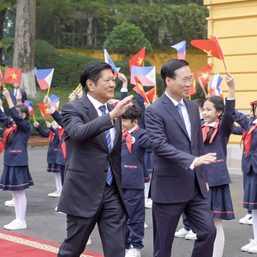SUMMARY
This is AI generated summarization, which may have errors. For context, always refer to the full article.

MANILA, Philippines – The Supreme Court (SC) has affirmed the unconstitutionality of the joint oil exploration deal among Philippine, Chinese, and Vietnamese firms, the High Court’s Public Information Office announced on Wednesday, July 5.
The High Court’s en banc denied with finality the motion for reconsideration against its original decision declaring the Joint Marine Seismic Undertaking (JMSU among China National Offshore Oil Corporation, Vietnam Oil and Gas Corporation, and Philippine National Oil Company) void and unconstitutional.
The SC said the motion, filed by the respondents through the Office of the Solicitor General, was denied due to lack of merit.
“In a Resolution in Bayan Muna Party-List Representatives Satur C. Ocampo and Teodoro A. Casiño, et al. [Petitioners] v. President Gloria Macapagal-Arroyo, et al.[Respondents] (G.R. No. 182734), the Court held that the motion for reconsideration merely repleaded the issues raised in the comment and memorandum, which the Court had already passed upon in the assailed Decision,” the High Court said.
With a vote of 12-2-1, the SC, in January, voided the agreement and said that only the Philippines can supervise the exploration of its natural resources. The agreement involved a 142,886-square-kilometer area in the South China Sea, with 80% of the said area within the Philippine 200-mile exclusive economic zone.
The SC case stemmed from the petition for certiorari and prohibition filed by former Bayan Muna lawmakers Satur Ocampo, Teodoro Casiño, and other Makabayan bloc members filed on May 21, 2008.
Resolution
In denying the motion, the SC said the agreement is unconstitutional because it involves the exploration of the country’s natural resources. The SC noted that the agreement clearly involves exploration as stated in the clause: “to engage in a joint research of petroleum resource potential.”
The respondents insisted that the agreement did not involve exploration by assailing the definition of “exploration” under the Republic Act No. 387 or Petroleum Act of 1949. The respondents argued that it was already repealed by Presidential Decree (PD) No. 87 or Oil and Exploration and Development Act of 1972.
However, the SC said that the PD does not provide a “contrary definition” for exploration, and does not define the said term.
In further explaining its resolution, the SC said that for a JMSU to be valid, it must fall under the following modes, provided under section 2, article XII of the 1987 Constitution:
- Directly by the state
- Through co-production, joint venture, or production-sharing agreements with Filipino citizens or qualified corporations
- Small-scale utilization of natural resources by Filipinos
- “Through agreements entered into by the President with foreign-owned corporations involving technical or financial assistance for large-scale exploration, development, and utilization of minerals, petroleum, and other mineral oils.”
The SC said the agreement did not fall under the first three modes since it involves Chinese and Vietnamese corporations. For the fourth mode, the Philippine president was neither a party nor a signatory to the agreement, said the High Court.
In the resolution, the SC also noted that the State has no full control and supervision under the agreement.
“The Court said that Respondents’ claim that the State did not lose control and supervision over information about our natural resources crumbles in light of JMSU’s provision stating that the parties to the agreement shall have equal rights, interest, and obligations,” the SC said, adding that it correctly took cognizance of the petition so there was no violation of the hierarchy of courts.
Why is the SC ruling relevant?
The SC ruling on the JMSU not only voided the oil deal with China and Vietnam, but also gave clearer definitions of the safeguards provided by the Constitution. In his analysis, retired SC senior associate justice Antonio Carpio said the ruling upheld the four modes mentioned by the SC.
Carpio said it is only in the first mode that other foreign companies can participate. He added that in the three other modes, only companies that are 60% owned by Filipinos can participate.
The ruling also clearly defined what exploration means – “a search or discovery of something in both its ordinary or technical sense.” – Rappler.com
Add a comment
How does this make you feel?





![[Free to Disagree] De Lima stood firm. But some men are trash.](https://www.rappler.com/tachyon/2024/07/TL-Leila-de-lima-stood-firm-some-men-brave-some-trash-July-1-2024.jpg?resize=257%2C257&crop_strategy=attention)






![[OPINION] Filipinos, is it time to retire ‘Miss Saigon’?](https://www.rappler.com/tachyon/2024/05/tl-retire-miss-saigon-05042024-2.jpg?resize=257%2C257&crop=261px%2C0px%2C720px%2C720px)



There are no comments yet. Add your comment to start the conversation.